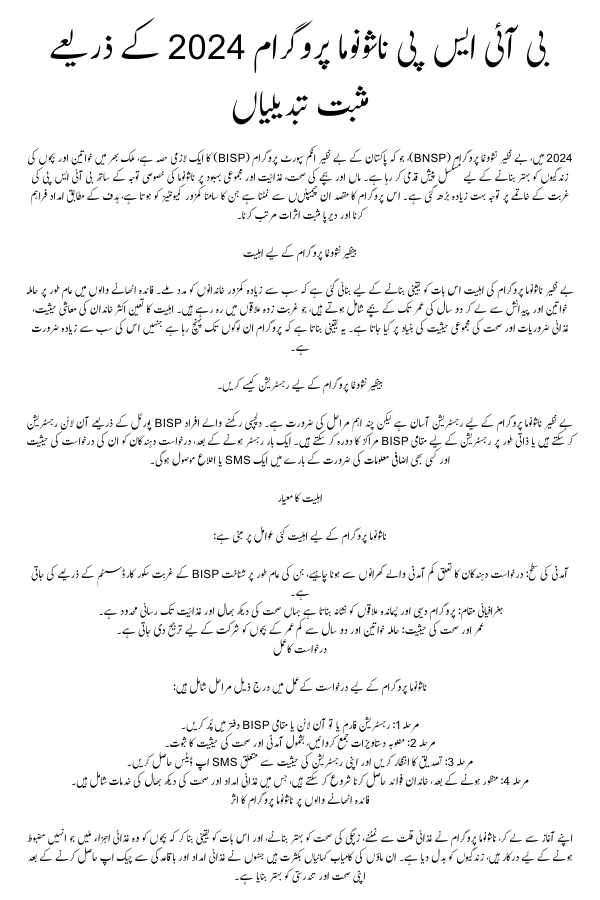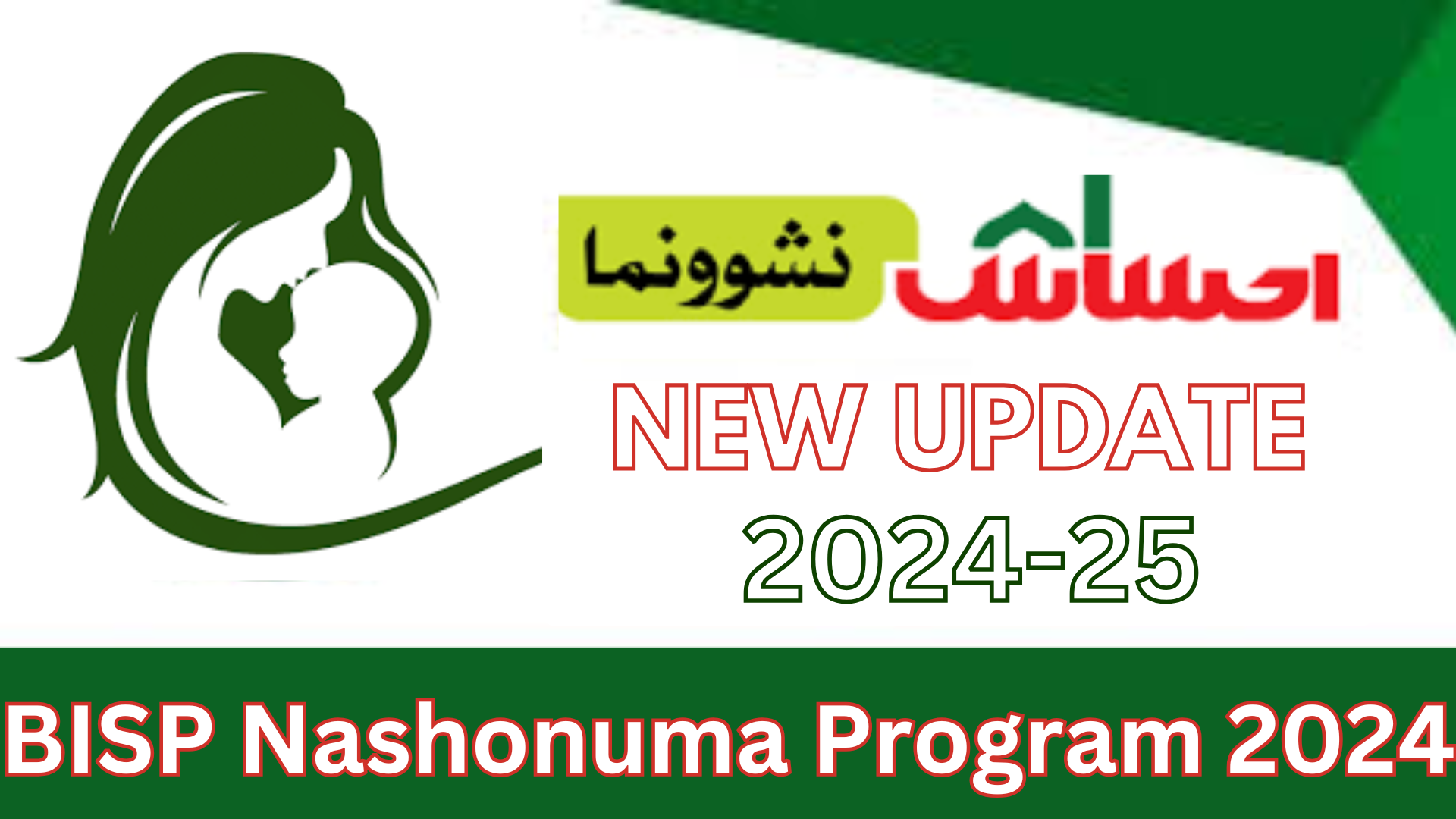Positive Changes Through The BISP Nashonuma Program
In 2024, the Benazir Nashonuma Program (BNSP), an essential arm of Pakistan’s Benazir Income Support Program (BISP), continues to make strides in improving the lives of women and children across the country. The BISP’s focus on poverty alleviation has been BISP Nashonuma Program greatly expanded with Nashonuma’s special attention to maternal and child health, nutrition, and overall well-being. This program aims to address the challenges that vulnerable communities face, providing targeted assistance and creating lasting positive impacts
READ MORE:Sehat Sahulat Program
Eligibility For The Benazir Nashunuma Program
The eligibility for the Benazir Nashonuma Program is designed to ensure that the most vulnerable families receive help. Beneficiaries typically include pregnant women and children from birth to the age of two, who are living in poverty-stricken areas. Eligibility is often determined based on the family’s economic status, nutritional needs, and overall health status. This ensures that the program is reaching those who need it most.
How to Register For The Benazir Nashunuma Program
Registration for the Benazir Nashonuma Program is simple but requires a few key steps. Interested individuals can register online through the BISP portal or visit local BISP centers for in-person registration. Once registered, applicants will receive an SMS or notification about the status of their application and any additional information they may need.
READ MORE:Kissan Khushhal Scheme
Eligibility Criteria
Eligibility for the Nashonuma Program is based on several factors:
- Income Level: Applicants must belong to low-income households, typically identified through the BISP’s poverty scorecard system.
- Geographical Location: The program targets rural and underdeveloped areas where access to healthcare and nutrition is limited.
- Age and Health Status: Women in pregnancy and children under two years of age are prioritized for participation.
Application Process
The application process for the Nashonuma Program involves the following steps:
- Step 1: Fill out the registration form either online or at a local BISP office.
- Step 2: Submit required documents, including proof of income and health status.
- Step 3: Wait for confirmation and receive SMS updates regarding your registration status.
- Step 4: Once approved, families can begin receiving benefits, which include nutritional assistance and healthcare services.
READ MORE:Benazir Taleemi Wazaif New Payment
Impact of the Nashonuma Program on Beneficiaries
Since its inception, the Nashonuma Program has transformed lives by addressing malnutrition, improving maternal health, and ensuring that children BISP Nashonuma Program receive the nutrients they need to grow strong. Success stories abound of mothers who have improved their health and well-being after receiving nutritional support and regular check-ups.

Government Support and Partnership in the Nashonuma Program
The government’s partnership with local healthcare providers and international organizations has been crucial in the Nashonuma Program’s success. Trained health professionals, community workers, and BISP Nashonuma Program nutritionists collaborate to ensure the program’s benefits are effectively delivered. This team effort creates a well-rounded support system for the families involved.
READ MORE:Kissan Cards Across Punjab
Health and Nutritional Benefits for Families
One of the most significant advantages of the Nashonuma Program is its focus on improving maternal and child health. Beneficiaries receive nutritional BISP Nashonuma Program food packages and regular health check-ups. This support prevents malnutrition, reduces infant mortality rates, and ensures that mothers can maintain good health during and after pregnancy.
Financial Assistance and How It Supports Families
The financial assistance component of the program plays a crucial role in alleviating the financial stress that low-income families face. Cash transfers enable mothers to purchase nutritious food, pay for medical services, and take care of other essential needs. This financial Nashonuma Program cushion is invaluable for families that otherwise may not have access to these vital resources.
Community Benefits and Long-Term Social Impact
On a broader scale, the Nashonuma Program is contributing to the reduction of poverty and improving social infrastructure in underprivileged communities. By addressing health issues and providing financial support, the program is fostering a healthier, more stable environment that can have lasting Nashonuma Program positive effects on future generations.
Conclusion
The Nashonuma Program represents a crucial initiative in improving the health and nutrition of vulnerable populations in Pakistan. With the 2024 updates, the program continues to evolve, ensuring that Nashonuma Program more families receive the support they need. Through better eligibility frameworks, accessible registration processes, and focused community support, the program is making a real difference. If you or someone you know is eligible, don’t hesitate to take advantage of this invaluable resource.
READ MORE:Using a Kisan Card
FAQs
- Who is eligible for the Benazir Nashonuma Program? The program targets low-income families with pregnant women and children under the age of two, particularly in rural areas.
- How can I register for the Benazir Nashonuma Program? You can register online through the BISP portal or visit a local BISP office to complete the registration process.
- What financial assistance does the program provide? The program offers cash transfers and nutritional food packages to help alleviate the financial burden on families.
- What health benefits does the Nashonuma Program provide? Beneficiaries receive regular health check-ups, prenatal care, and nutritional support to improve maternal and child health.
- Can I apply if I live in an urban area? While the program primarily targets rural and underdeveloped areas, families in urban areas may also be eligible based on their income and health needs.
